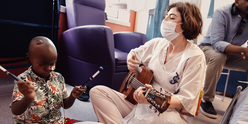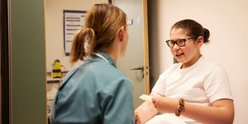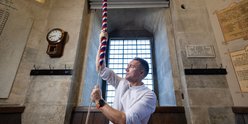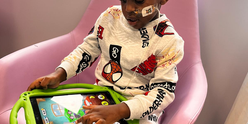‘She’s doing fantastically’: Meet 12-year-old Grace
24 Apr 2024, 12:21 p.m.
The Children’s Cancer Centre at GOSH will help children like Grace.
Living with cancer is different for every child. It can mean countless rounds of debilitating treatment. Dealing with side effects like mouth ulcers and losing your hair. Not knowing when you'll sleep in your own bed again.
For 12-year-old Grace, being diagnosed with acute lymphoblastic leukaemia (ALL), a type of blood cancer, meant being separated from her twin brother, Max. The pair were just four years old when Grace was referred to GOSH, where her family was told the news no one wants to hear.
Receiving a diagnosis
“Our beautiful twins had just started primary school when, in the space of 24 hours, our lives were turned around,” says Grace’s mum, Kelly. “Grace had been tired at school and developed a cold that didn’t completely go away. One night, she had really bad sweats, so I took her to the doctors and insisted on a chest x-ray in case it was pneumonia. We were sent to A&E, where a nurse noticed three red spots on Grace's shoulder.
“We were in A&E for hours. Suddenly, we were fast-tracked into a room and told that Grace had leukaemia. That moment was as horrific and awful as you can imagine.”
A few days later, Grace was transferred to GOSH.
“Arriving at GOSH felt surreal,” Kelly says. “We learned that Grace had ALL, which has a better outlook than other cancers for most typically developing children, but it was always going to be harder for Grace because she has Down’s syndrome.
“I remember Max asking me if his sister was going to die and I couldn’t answer him, so I told him she was in the best children’s hospital in the world.”
Grace was put on a two-year treatment plan, beginning with six weeks of intensive chemotherapy.
“I couldn’t believe it was happening. It was difficult to come to terms with the reality that my daughter was so sick. Grace was often in good spirits; it was hard to comprehend she had cancer.”

The first six weeks
During Grace’s treatment, Kelly and her husband Nick alternated between time at GOSH and time at home with Max.
“There was a lot to take in during those first six weeks,” Kelly says. “Every day you find out something new and there’s the awful wait to learn whether it’s a high-risk or low-risk cancer. Grace was classed as a low-risk cancer. I know you should be grateful for that, but it didn’t matter to me – it was cancer.
“Grace needed the less invasive chemotherapy. I can’t imagine what the harsher chemotherapy is like, because her treatment was hard enough. She got high temperature spikes and painful mouth ulcers and couldn’t eat.”
Special moments at GOSH
Grace’s treatment took place over Christmas, and Kelly says seeing other families enjoying the season on social media was “heartbreaking”. The family stayed with Max in GOSH Charity-funded accommodation near the hospital so they could be close to Grace.
“We were trying to be parents to a little boy who was worried about his sister but also excited about Christmas,” Kelly says. "Looking back at the pictures, Grace was really sick at this point. Her hair was all gone, and she was very pale... On Christmas day, we all put our Christmas jumpers on but trying to be jolly was heartbreaking.”
Grace also spent her birthday in hospital. The nurses celebrated by bringing her a cake and singing and dancing.
“They go over and above what they need to do in their role,” Kelly says. “They were brilliant with Grace and amazing with me. They were unbelievably good at supporting me by listening and being patient.”

Grace and her brother Max at GOSH.
'GOSH represents hope’
While the treatment Grace received at GOSH was world-class, Kelly says the time in hospital was difficult.
“You meet so many other families on the cancer wards. Even though you want to have a laugh and a joke to try and make it more bearable, it feels wrong to do that because there’s so much tragedy. It’s hard to smile because you’re all living this nightmare.
“There was a shared family kitchen on the ward, but there was nowhere to go and get some fresh air. As grateful as we were to be at GOSH, my mental health was suffering. Our room was small and not very private; we were in isolation with one little window. It’s not the kind of space you need when you’re feeling your most vulnerable.”
The new Children’s Cancer Centre will be built with children and their families at its heart, with patient bedrooms that are large enough for families to stay together in comfort. It will be a place where children have access to play and education alongside pioneering treatments, where access to the outdoors is a priority, and a focus on nutrition helps fuel recovery.
“The new centre will feature a roof garden offering peace, tranquillity and the much-needed space to gather your thoughts. This is something our family can particularly resonate with,” Kelly says.
“GOSH represents hope. And at the new centre, the infrastructure will reflect that hope and expert care for the whole family.”
Going home
Shortly after Christmas, the family were told Grace could leave GOSH and continue chemotherapy at home, provided she stay in isolation. Six months later, she was well enough to go back to school. She finished treatment close to her seventh birthday.
Today, Grace is a happy and healthy 12-year-old who loves swimming, singing, dancing and acting. She has started senior school, attends after school clubs and enjoys taking her dog, Pebbles, for walks around the block.
“Grace is doing fantastically,” Kelly says. “I can never repay the hospital staff for looking after my girl. I want to continue fundraising for the rest of my life to help other children like Grace.”

Max and Grace today.






